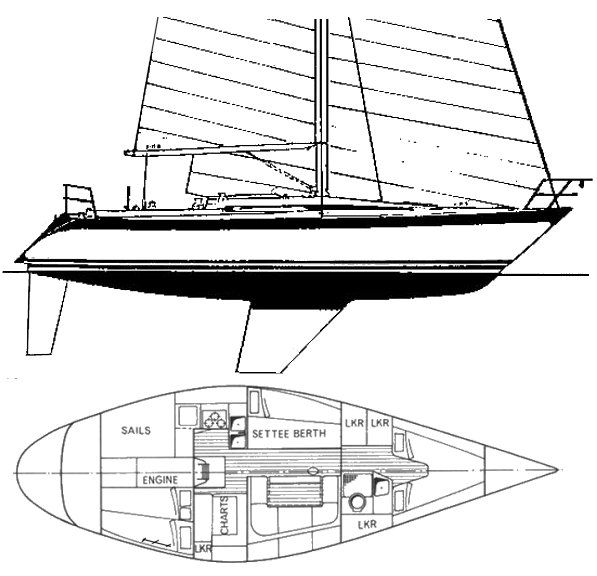The Oyster 37 emerges as a compelling example of a classic cruiser-racer, designed for discerning sailors seeking a blend of performance and comfortable offshore capabilities. Introduced in 1978, this monohull yacht was conceived by the renowned naval architecture firm Holman & Pye with the specific goal of creating a "cruiser with winning ways". Distinguished by its robust construction and thoughtful design, the Oyster 37 quickly established a reputation as a solid and capable vessel in the sailing community. The yacht's construction was entrusted to Landamores Yacht Builders, a company with a century-long legacy of British craftsmanship and a significant history as "founder builders" for Oyster Marine.
Oyster 37 Information, Review, Specs

- Make
- Oyster
- Model
- 37
- Number Built
- 40
- Production Year(s)
- 1978 - 1981
History and Design
The Oyster 37's journey began with a design brief from Holman & Pye to rate as a one-tonner under the International Offshore Rule (IOR), marking its origins as an IOR 1-ton prototype. Production of the Oyster 37 ran from 1978 to 1981, with approximately 40 units built during this period. Landamores Yacht Builders, based in the Norfolk Broads, brought their esteemed manufacturing ethos to the project, known for their "quality craftsmanship, design and high-spec finish". This collaboration ensured that the Oyster 37, while rooted in a performance-oriented IOR design, was executed with the meticulous attention to detail and robust construction characteristic of Landamores and the burgeoning Oyster brand. While the original Oyster 37 had its defined production run, later related models like the Oyster Heritage 37 were introduced, though distinct from this initial design.
Sailing Performance and Handling
The Oyster 37's design balances its racer-cruiser aspirations with a strong emphasis on stability and a comfortable motion. With a Sail Area to Displacement (SA/D) ratio of approximately 15.83, she exhibits moderate performance, suggesting good handling in a range of conditions, particularly excelling as winds build rather than in very light airs. Her Ballast to Displacement (B/D) ratio of roughly 0.44 indicates a high degree of stiffness, allowing her to stand up well to a breeze and maintain a powerful sail plan. This high ballast ratio contributes significantly to her stability, making for a reassuring ride offshore.
Despite her origins as an IOR one-tonner, the production Oyster 37, with a Displacement to Length (D/L) ratio of around 544.1, falls into the category of a very heavy displacement vessel for its length. This substantial displacement translates to a comfortable and gentle motion in a seaway, reducing pitching and hobby-horsing. Owners report that the Oyster 37 "feels very solid" with excellent steering, especially for a wheel-steered boat. She is noted as being "particularly fast upwind", a testament to her well-designed hull form and rig, which allow her to point well and make good progress against the wind. Overall, her sailing characteristics are consistent with a well-balanced race/cruiser, prioritizing stability and solid performance over extreme light-air speed.
Accommodations and Layout
While specific interior dimensions like maximum headroom are not detailed in the provided data, the Oyster 37 was designed to offer "spacious accommodation" for its size. Oyster Yachts, and Landamores as their builder, were renowned for their high-quality interior finishes, characterized by "quality and attention to detail" comparable to any constructor worldwide. The design offered "several interior layouts," allowing for a degree of customization to suit individual owner preferences.
Typically, yachts of this era and caliber would feature a well-appointed interior including a V-berth forward, a main salon with settees that often convert into berths, a galley, and a dedicated head compartment. Descriptions suggest a "beautifully laid out and highly functional interior". Owners generally report good storage and overall finish quality, reflecting Oyster's commitment to building yachts designed for comfortable cruising.
Owner's Perspectives
Owners of the Oyster 37 generally praise its robust build quality and seakindly motion. Many appreciate the yacht's solid feel and responsive steering, which contributes to a confident experience at sea. The motion in a seaway is often described as gentle, providing comfort even in challenging conditions. Some owners have specifically noted the durability of the original construction, with one reporting no issues with leaking lockers or storage, reflecting the inherent quality of the build. While individual maintenance needs arise with any vessel over forty years old, the Oyster 37 maintains a reputation as a well-built, capable cruising yacht.
Measurements
Construction & Hull
- Construction Material
- Fiberglass (Solid)
- Hull Type
- Monohull Sailboat
- Keel Type
- Fin
- Rudder
- 1x Spade
- Ballast
- 7270 lbs (Lead)
- Displacement
- 16530 lbs
- Water Capacity
- -
- Fuel Capacity
- -
Engine
- Engine Make
- Perkins
- Engine Model
- —
- Engine Type
- —
- Engine HP
- —
- Engine Count
- 1
- Drive Type
- —
- Fuel Type
- Diesel
Rig & Sails
- Rig Type
- Masthead Sloop
- P (Main Luff)
- 43.58 ft
- E (Main Foot)
- 12 ft
- I (Foretriangle Height)
- 49.5 ft
- J (Foretriangle Base)
- 15.5 ft
- Forestay Length (est)
- 51.87 ft
- Main Sail Area
- 261.48 sqft
- Foretriangle Sail Area
- 383.63 sqft
- Total Sail Area (Reported)
- 645 sqft
- Total Sail Area (Calc)
- 645.11 sqft
Dimensions
- LOA
- 37 ft
- LWL
- 31.17 ft
- Beam
- 12.08 ft
- Draft
- 6.16 ft
- Max Headroom
- -
- Air Draft
- -
Calculations
- Hull Speed
- 7.48 kn
- Pounds per Inch Immersion
- 1